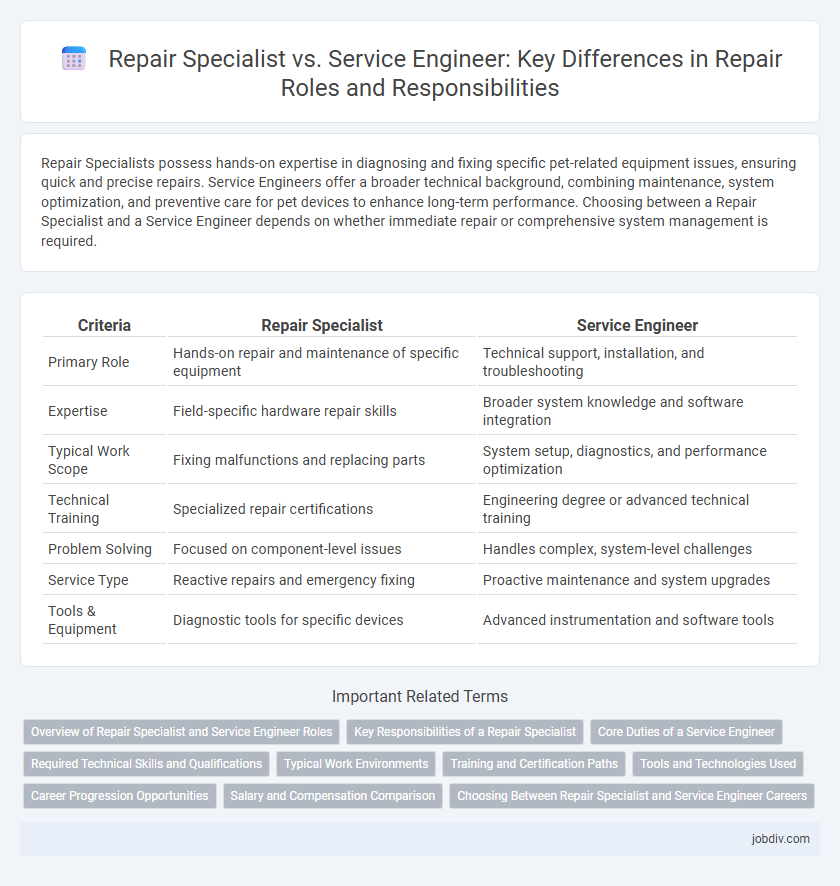Repair Specialists possess hands-on expertise in diagnosing and fixing specific pet-related equipment issues, ensuring quick and precise repairs. Service Engineers offer a broader technical background, combining maintenance, system optimization, and preventive care for pet devices to enhance long-term performance. Choosing between a Repair Specialist and a Service Engineer depends on whether immediate repair or comprehensive system management is required.
Table of Comparison
| Criteria | Repair Specialist | Service Engineer |
|---|---|---|
| Primary Role | Hands-on repair and maintenance of specific equipment | Technical support, installation, and troubleshooting |
| Expertise | Field-specific hardware repair skills | Broader system knowledge and software integration |
| Typical Work Scope | Fixing malfunctions and replacing parts | System setup, diagnostics, and performance optimization |
| Technical Training | Specialized repair certifications | Engineering degree or advanced technical training |
| Problem Solving | Focused on component-level issues | Handles complex, system-level challenges |
| Service Type | Reactive repairs and emergency fixing | Proactive maintenance and system upgrades |
| Tools & Equipment | Diagnostic tools for specific devices | Advanced instrumentation and software tools |
Overview of Repair Specialist and Service Engineer Roles
Repair Specialists focus on diagnosing, troubleshooting, and repairing specific equipment or systems with hands-on technical expertise, often in field or workshop settings. Service Engineers combine technical skills with customer service, conducting maintenance, installations, and complex repairs while ensuring optimal system performance and client satisfaction. Both roles require strong problem-solving capabilities, but Service Engineers typically handle a broader range of tasks, including preventive maintenance and client interaction.
Key Responsibilities of a Repair Specialist
A Repair Specialist focuses on diagnosing, troubleshooting, and repairing malfunctioning equipment, ensuring optimal functionality and minimizing downtime. Their key responsibilities include performing detailed inspections, replacing faulty parts, and conducting preventive maintenance to extend the lifespan of devices. Unlike Service Engineers, Repair Specialists primarily handle hands-on repair tasks and technical diagnostics rather than system design or client consultation.
Core Duties of a Service Engineer
Service engineers specialize in diagnosing, maintaining, and repairing complex machinery and equipment, ensuring optimal operational performance across industries such as manufacturing, healthcare, and IT. Their core duties include conducting preventive maintenance, troubleshooting technical malfunctions, and implementing software updates or hardware replacements. Unlike repair specialists who focus on reactive fixes, service engineers emphasize system optimization and long-term reliability through detailed inspections and technical support.
Required Technical Skills and Qualifications
Repair specialists require hands-on expertise with diagnostic tools, mechanical systems, and electronic components, often holding certifications such as CompTIA A+ or manufacturer-specific credentials. Service engineers possess advanced technical skills in system analysis, programming, and integration, typically requiring a bachelor's degree in engineering or a related field and professional licenses. Both roles demand strong problem-solving abilities, but service engineers focus more on complex system design and implementation, while repair specialists concentrate on troubleshooting and maintenance.
Typical Work Environments
Repair specialists commonly operate in hands-on environments such as workshops, manufacturing plants, and on-site locations where equipment maintenance and troubleshooting are required. Service engineers typically work in more technical settings, including factories, corporate facilities, and client sites, often involving system installations, upgrades, and process optimizations. Both roles demand adaptability to industrial, commercial, and field environments, emphasizing practical expertise and problem-solving skills.
Training and Certification Paths
Repair specialists typically undergo focused technical training in diagnostics and hands-on repair techniques, often completing certification programs like CompTIA A+ or manufacturer-specific credentials. Service engineers receive advanced education, including engineering degrees and specialized certifications such as Certified Maintenance & Reliability Professional (CMRP), emphasizing system optimization and preventive maintenance. Both career paths prioritize ongoing professional development, but service engineers engage more in complex troubleshooting and system integration training.
Tools and Technologies Used
Repair specialists primarily utilize diagnostic tools and handheld instruments designed for troubleshooting hardware and software issues, focusing on immediate repairs and component replacements. Service engineers employ advanced technologies, including predictive maintenance software, system analytics platforms, and specialized calibration devices, to perform in-depth system evaluations and preventive servicing. Both roles leverage industry-specific software and hardware tools tailored to their respective scopes, but service engineers typically integrate more complex, data-driven technologies in their processes.
Career Progression Opportunities
Repair specialists often begin their careers focusing on hands-on technical skills and troubleshooting specific equipment faults. Service engineers typically experience broader career progression opportunities by developing expertise in system integration, preventive maintenance, and client-facing problem resolution. Advancing in either career may lead to roles in project management, technical consultancy, or specialized engineering fields with increased responsibility and salary potential.
Salary and Compensation Comparison
Repair specialists typically earn a median annual salary ranging from $45,000 to $65,000, depending on industry and experience, while service engineers command higher compensation averaging between $60,000 and $85,000 due to their specialized technical skills and engineering background. Benefits packages for service engineers often include performance bonuses, health insurance, and retirement plans, reflecting their critical role in complex system maintenance and customer support. Salary growth for repair specialists is generally slower, whereas service engineers experience accelerated compensation increases aligned with advanced certifications and project leadership roles.
Choosing Between Repair Specialist and Service Engineer Careers
Choosing between a career as a Repair Specialist or a Service Engineer depends on your technical skills and industry preferences. Repair Specialists focus primarily on diagnosing and fixing faulty equipment, often specializing in specific devices or systems, while Service Engineers engage in installation, maintenance, and complex system troubleshooting across various industries. Evaluating your interest in hands-on repair work versus a broader engineering role with project management responsibilities can guide your decision in pursuing the most suitable career path.
Repair Specialist vs Service Engineer Infographic

 jobdiv.com
jobdiv.com